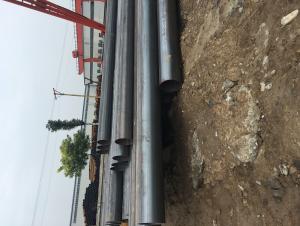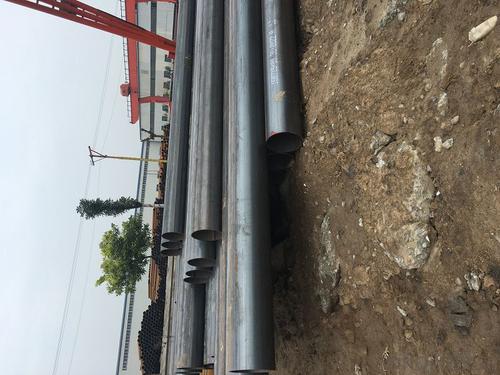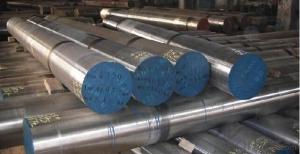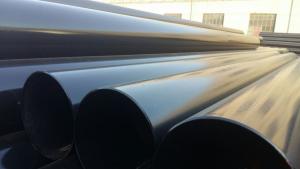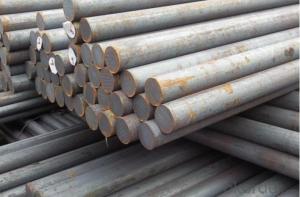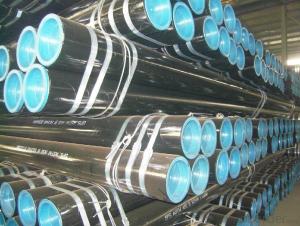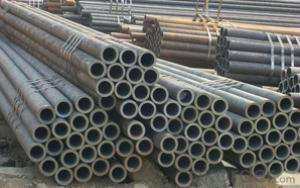Alloy structural steel seamless steel pipe
- Loading Port:
- Tianjin
- Payment Terms:
- TT or LC
- Min Order Qty:
- 25 m.t.
- Supply Capability:
- 1000 m.t./month
OKorder Service Pledge
OKorder Financial Service
You Might Also Like
1、Structure of Alloy structural steel seamless steel pipe :
Seamless pipe is formed by drawing a solid billet over a piercing rod to create the hollow shell. As the manufacturing process does not include any welding, seamless pipes are perceived to be stronger and more reliable. Historically seamless pipe was regarded as withstanding pressure better than other types, and was often more easily available than welded pipe.
2、Main Features of Alloy structural steel seamless steel pipe :
• High manufacturing accuracy
• High strength
• Small inertia resistance
• Strong heat dissipation ability
• Good visual effect
• Reasonable price
3、 Alloy structural steel seamless steel pipe Specification:
Standard | GB, DIN, ASTM ASTM A106-2006, ASTM A53-2007 |
Grade | 10#-45#, 16Mn 10#, 20#, 45#, 16Mn |
Thickness | 8 - 33 mm |
Section Shape | Round |
Outer Diameter | 133 - 219 mm |
Place of Origin | Shandong, China (Mainland) |
Secondary Or Not | Non-secondary |
Application | Hydraulic Pipe |
Technique | Cold Drawn |
Certification | API |
Surface Treatment | factory state or painted black |
Special Pipe | API Pipe |
Alloy Or Not | Non-alloy |
Length | 5-12M |
Outer Diameter | 21.3-610mm |
Grade | 20#, 45#, Q345, API J55, API K55, API L80, API N80, API P110, A53B |
Standard | ASME, ASTM |
1) Material:20#(ASTM A 106/A53 GRB.API5LGRB,GB),45#,16Mn,10#.
2) Specification range:OD:21.3-610mm,WT:6-70mm,length:6-12m or according to the requirement of clients.
3) Excutive standards:GB,ASME API5L.ASTM A 106/A53,Despite of the above standards,we can also supply seamless steel pipe with standard of DIN,JIS,and so on,and also develop new products according to the requirements of our clients!
4) Surface:black lacquered,varnish coating or galvanized.
5) Ends:Beveled or square cut,plastic capped,painted.
6) Packing:bundles wrapped with strong steel strip,seaworthy packing.
4、Packaging & Delivery
Packaging Details: | seaworthy package,bundles wrapped with strong steel strip |
Delivery Detail: | 15-30days after received 30%TT |
5、FAQ of Alloy structural steel seamless steel pipe
①How is the quality of your products?
Our products are manufactured strictly according to national and internaional standard, and we take a test
on every pipe before delivered out. If you want see our quality certifications and all kinds of testing report, please just ask us for it.
Guaranteed: If products’ quality don’t accord to discription as we give or the promise before you place order, we promise 100% refund.
②How about price?
Yes, we are factory and be able to give you lowest price below market one, and we have a policy that “ for saving time and absolutely honest business attitude, we quote as lowest as possible for any customer, and discount can be given according to quantity”,if you like bargain and factory price is not low enough as you think, just don’t waste your time.Please trust the quotation we would give you, it is professional one.
③Why should you chose us?
Chose happens because of quality, then price, We can give you both.Additionally, we can also offer professional products inquiry, products knowledge train(for agents), smooth goods delivery, exellent customer solution proposals.Our service formula: good quality+good price+good service=customer’s trust
SGS test is available, customer inspection before shipping is welcome, third party inspection is no problem.
6、 Alloy structural steel seamless steel pipe Images:
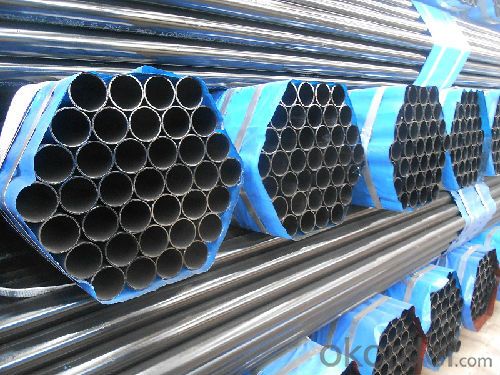
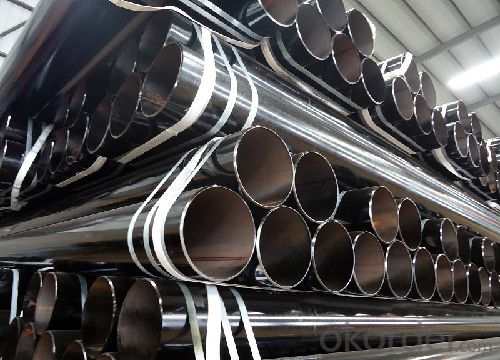
- Q: Can steel pipes be used for transporting liquids?
- Yes, steel pipes can be used for transporting liquids. Steel pipes offer excellent strength, durability, and resistance to corrosion, making them suitable for various applications, including the transportation of liquids such as water, oil, and gas.
- Q: How do you calculate the pipe head loss for steel pipes?
- To calculate the pipe head loss for steel pipes, you can use the Darcy-Weisbach equation. This equation relates the head loss (hL) to the flow rate (Q), pipe diameter (D), pipe length (L), fluid density (ρ), fluid velocity (V), and a friction factor (f). The formula is as follows: hL = (f * (L/D) * (V^2))/(2g) Where: - hL is the head loss (measured in meters) - f is the friction factor (dimensionless) - L is the pipe length (measured in meters) - D is the pipe diameter (measured in meters) - V is the fluid velocity (measured in meters per second) - g is the acceleration due to gravity (usually taken as 9.81 m/s^2) The friction factor (f) depends on the Reynolds number (Re) of the flow, which is a dimensionless quantity representing the ratio of inertial forces to viscous forces. The Reynolds number can be calculated as: Re = (ρ * V * D) / μ Where: - Re is the Reynolds number (dimensionless) - ρ is the fluid density (measured in kg/m^3) - V is the fluid velocity (measured in meters per second) - D is the pipe diameter (measured in meters) - μ is the dynamic viscosity of the fluid (measured in Pa·s or N·s/m^2) The friction factor (f) can be obtained from empirical correlations or from Moody's diagram, which relates it to the Reynolds number and the relative roughness of the pipe surface. By substituting the calculated friction factor (f) and other known values into the Darcy-Weisbach equation, you can determine the head loss in the steel pipe. It is important to note that the head loss is a measure of energy loss due to friction and other factors, and it is typically expressed in terms of pressure drop or height difference.
- Q: Can steel pipes be used for roller coaster tracks?
- Yes, steel pipes can be used for roller coaster tracks. Steel is a commonly used material for roller coaster tracks due to its strength, durability, and ability to withstand intense forces and high speeds.
- Q: Can steel pipes be used for underground sewerage systems?
- Indeed, underground sewerage systems can make use of steel pipes. These pipes possess remarkable strength and durability, rendering them suitable for the transportation of sewage beneath the surface. Their resistance to corrosion is high, allowing them to withstand the pressure and weight of the soil above. Moreover, steel pipes boast an extended lifespan and exhibit resilience against environmental factors like moisture, chemicals, and temperature variations. Furthermore, the ease of welding steel pipes makes the process of installation and repairs more convenient. Nevertheless, it is crucial to ensure that these steel pipes are adequately coated or lined to prevent corrosion and comply with local regulations and standards pertaining to underground sewerage systems.
- Q: How do steel pipes handle chemical exposure?
- Steel pipes are renowned for their excellent ability to resist exposure to chemicals. The strength and durability of steel make it a dependable material for managing different types of chemicals. Steel pipes can endure contact with a diverse array of corrosive substances like acids, alkalis, solvents, and gases without undergoing significant degradation or damage. One of the primary factors contributing to the effectiveness of steel pipes in handling chemical exposure is their innate resistance to corrosion. Steel naturally resists corrosion and can create a protective oxide layer on its surface, which acts as a barrier against chemical attack. Additionally, steel pipes can be coated or lined with materials that have corrosion-resistant properties, such as epoxy, polyethylene, or cement, to offer additional defense against aggressive chemicals. Furthermore, steel pipes find widespread use in industrial settings where they encounter various chemicals. They are extensively employed in chemical plants, refineries, water treatment facilities, and other industries that require the transportation or storage of chemicals. Steel pipes can withstand the high pressures and temperatures associated with these processes while retaining their structural integrity and resistance to chemicals. However, it is important to acknowledge that the resistance of steel pipes to chemical exposure may vary depending on the specific type and concentration of the chemical. Certain highly corrosive substances may necessitate additional measures, such as specialized coatings or alloys, to ensure long-term protection. In conclusion, steel pipes are generally well-suited for managing chemical exposure due to their inherent resistance to corrosion, durability, and versatility. Their capability to endure a wide range of corrosive substances makes them a trustworthy choice for diverse industrial applications involving the transportation and storage of chemicals.
- Q: What are the thermal properties of steel pipes?
- Steel pipes have excellent thermal conductivity, allowing them to efficiently transfer heat. They also have a high melting point, making them suitable for high-temperature applications. Moreover, steel pipes have a low coefficient of thermal expansion, meaning they can withstand significant temperature changes without warping or deforming.
- Q: Are steel pipes suitable for fire protection systems?
- Yes, steel pipes are suitable for fire protection systems. They have excellent fire resistance properties and can withstand high temperatures, making them ideal for conveying water or other fire suppressants in fire protection systems. Steel pipes are also strong, durable, and resistant to corrosion, ensuring long-term reliability and effectiveness in fire protection applications.
- Q: How do you calculate the flow rate of water in steel pipes?
- To calculate the flow rate of water in steel pipes, you need to consider the pipe's diameter, length, and the pressure difference across the pipe. Using formulas like the Darcy-Weisbach equation or the Hazen-Williams equation, you can determine the flow rate by plugging in these variables along with the fluid properties.
- Q: Galvanized steel pipe in addition to good rust resistance, what are the advantages?
- Galvanized steel is cracking for 39 days and will not, especially suitable for Northern very cold environment.
- Q: Are steel pipes resistant to chemicals?
- Yes, steel pipes are generally resistant to chemicals. They have excellent corrosion resistance properties, making them suitable for transporting various chemicals in industries such as oil and gas, chemical processing, and wastewater treatment. However, the level of resistance can vary depending on the specific type of chemical and the grade of steel used. In some cases, additional protective coatings may be required to enhance chemical resistance.
Send your message to us
Alloy structural steel seamless steel pipe
- Loading Port:
- Tianjin
- Payment Terms:
- TT or LC
- Min Order Qty:
- 25 m.t.
- Supply Capability:
- 1000 m.t./month
OKorder Service Pledge
OKorder Financial Service
Similar products
Hot products
Hot Searches
Related keywords
